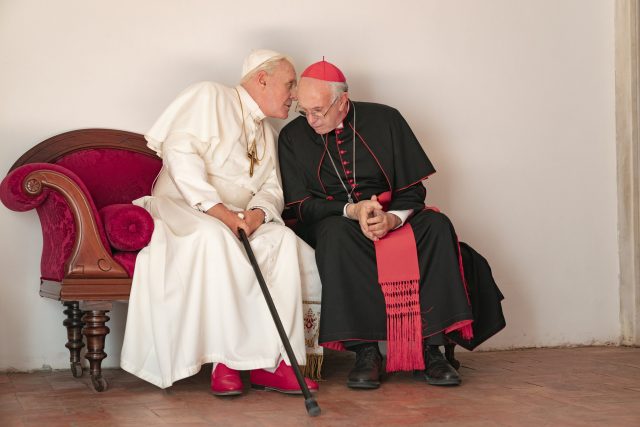The Two Popes: Anybody Could Be That Guy, by David Bax

Fernando Meirelles’ The Two Popes opens with a brief scene of Pope Francis (Jonathan Pryce) speaking on the phone with a customer service representative, trying to buy a plane ticket. It’s not as laugh out loud funny as President Bartlet calling the Butterball hotline on The West Wing but it does serve as a heads up that, despite some of the heady theological discussions into which we’ll soon be wading, this is also going to be something of a comedy. There’s the shot of Pryce as pre-Francis Cardinal Bergoglio removing a cross from around his neck and placing it carefully in a bin at airport security. There’s the bit where, running late for a meeting with Pope Benedict XVI (Anthony Hopkins), Bergoglio has to change into his vestments at a roadside panini stand. And then there’s the revelation that Benedict’s favorite TV show is the Austrian dog cop series Kommissar Rex. All of these and more encourage laughter but they also serve the movie’s purposes of re-humanizing and empiricizing the men who occupy the chair of St. Peter.
After that opening scene, we flash back to 2005, the death of Pope John Paul II and the subsequent election of Cardinal Ratzinger, who would become Benedict. Then the meat of the story takes place a few years later, when Bergoglio visits Benedict at the papal summer residence. He doesn’t know why he’s been summoned but he hopes to get the pope to approve his resignation. The two will spend the next 24 hours or so walking, sitting, eating and, mostly, talking.
The Two Popes, then, is set up as a dialectic, a snapshot of the church at a crossroads, with conservatism (and scandal) on one side and reform on the other. These discussion are well written and exceptionally well acted by Pryce and Hopkins but the repeated reminders that Benedict is perceived as a “Nazi” and the contrasting portrayal of Bergoglio as an open-minded and humble man of the people make it pretty clear which argument the film prefers. And with the current state of conservatism and its relationship to Nazis being what it is, it’s hard to blame Meirelles and screenwriter Anthony McCarten (adapting his own play) for choosing sides. Still, the result would likely have been more engaging and impactful if we saw Benedict’s traditionalist interpretation of the role of the church and the very nature of God as equal to Bergoglio’s. Instead, we are charmed by the minor things they have in common, like not drinking coffee in the evening because it keeps them up.
We do eventually, though, come to learn that Bergoglio is not as perfect and unassailable as he at first seems. Details of his past and the church’s come up, first as bursts of documentary montage and then as full scenes with Juan Minujín as the young Bergoglio.
Oddly, the the sequences that would seem more stagey on paper–those of the current and future pope talking for minutes on end–are more filmic than the period piece flashbacks. Those, which start in black and white and only turn to color when Bergoglio joins the seminary, feel like docudrama. But the more modern day scenes are replete with inserts of garments and other papal accoutrements that remark on the deep-seated fetishism of Catholicism. And, during the most heated debate, which takes place in the garden, the sounds of chirping birds and insects become cacophonous, almost menacing.
In another stylistic flourish, Bryce Dessner’s score incorporates some of the popular music Bergoglio enjoys, from “Dancing Queen” to “Eleanor Rigby.” It’s fun but it’s also indicative of the film’s superficial preoccupation with upholding Francis’ reputation as the cool pope. Still, if you look past The Two Popes‘ reductive outer shell, you’ll find that what’s inside can be a treat for the mind and the senses.





























Is there anything in it about the current Pope’s problems regarding the protecting of abusers?
yeah, it’s touched on (in a big way, but it’s not the main thrust of the film). i just watched it last night, it was much better than i expected, though the Argentine flashbacks (while necessary) could feel like a slog, b/c the actors and characters aren’t quite as engaging as the two guys chatting in the Vatican